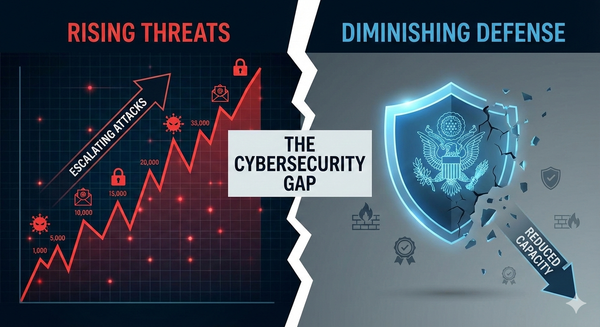Why the RaccoonO365 Takedown Should Worry Every Business Owner

Hi all, I hope you all had a great day. Today, I will provide you with breaking news about a massive cybersecurity takedown that happened this week and why it should matter to every business owner.
I've been in the IT trenches for over two decades. Honestly, the Microsoft takedown of RaccoonO365 this week has me more concerned about the future of business email security than any single incident I've seen in years.
While everyone celebrates the seizure of 338 malicious websites, I'm looking at what this case tells us: Cybercrime has gone corporate, and most businesses aren't ready for what's coming next.
What Actually Happened (In Plain English)
Let me break down what RaccoonO365 really was, because the technical jargon in most coverage misses the bigger picture.
Imagine if someone created a McDonald's franchise model, but instead of selling burgers, they were selling "easy crime kits" to steal your business email passwords. That's what RaccoonO365 did.
For $355 per month (30-day plan) or $999 (90-day plan), anyone—and I mean *anyone*—could subscribe to their service and immediately start stealing Microsoft 365 login credentials from businesses worldwide. No technical skills required. No programming knowledge needed. Just pay your subscription fee and start targeting companies.
The results? In just over a year:
- 5,000+ stolen business email accounts across 94 countries
- 2,300+ U.S. organizations targeted in tax-themed scams
- 20+ healthcare organizations compromised
- At least $100,000 in criminal profits
This should worry any business: They had 850 paying customers on their private Telegram channel. Think about that moment—850 people are actively running email theft operations against companies like yours.
Why I'm More Worried Than Relieved
Everyone's patting Microsoft and Cloudflare on the back for this takedown, and don't get me wrong—it's excellent work. But in my experience and opinion, when you shut down one cyber criminal operation, three more pop up to fill the gap.
Here's what really concerns me about RaccoonO365:
The "Uber-ization" of Cybercrime: Just like Uber made it easy for anyone to become a driver, RaccoonO365 made it easy for anyone to become a cybercriminal. I've seen this evolution coming, but the scale and simplicity here are unprecedented.
The Quality Problem: I've analyzed hundreds of phishing emails over the years, and the templates these criminals were using are good—really good. They perfectly mimic Microsoft, DocuSign, and Adobe—brands your employees interact with daily. Even I had to look twice at some of their examples.
The Volume Game: One subscription allowed criminals to target 9,000 email addresses "per day". Think about your company—how many employees do you have? 50? 200? A single RaccoonO365 customer could target your entire organization multiple times daily.
The Real Business Impact You Need to Understand
I've helped dozens of companies recover from email breaches, and here's what actually happens when these attacks succeed:
Week 1-2: Chaos
- The IT team works 80-hour workweeks trying to figure out what was compromised
- Leadership can't access critical business emails
- Customers start asking questions about data security
- Legal team gets involved for breach notification requirements
Months 1-3: The Bills
- Incident response consultants: $15,000-$50,000 minimum
- New security tools and licenses: $25,000-$100,000
- Legal and compliance costs: $10,000-$500,000 (especially healthcare)
- Lost productivity and business disruption: impossible to calculate
Long-term: Trust Recovery
- Customer confidence takes months or years to rebuild
- Insurance premiums increase significantly
- Regulatory scrutiny intensifies
- Competitive disadvantage from security reputation damage
A successful small manufacturing company nearly went under after a similar attack led to a ransomware infection that shut down production for three weeks.
What You Can Do Right Now
After dealing with the aftermath of these attacks for years, here's my practical advice for business owners:
1. Test Your People (This Week)
Send a fake phishing email to your team and see who clicks. I recommend using [KnowBe4](https://knowbe4.com) or similar services. If more than 10% of your team fails, you have an urgent training problem.
2. Audit Your Email Security (This Month)
Most businesses use basic email security, which is like having a screen door on a submarine. Ask your IT provider: "How do we handle sophisticated phishing that looks exactly like Microsoft emails?" If they mention only spam filtering, you need better protection.
3. Implement Multi-Factor Authentication Everywhere
I cannot stress this enough—MFA (multi-factor authentication) would have stopped most RaccoonO365 attacks. Yes, it's slightly inconvenient. Getting robbed is more inconvenient.
4. Have an "Oh Shit" Plan
When (not if) someone in your organization gets fooled, what happens? Who do you call? What accounts get locked? I've seen companies lose days of response time because nobody knew what to do.
5. Get Professional Help
This isn't a DIY situation anymore. If you wouldn't perform surgery on yourself, don't try to architect enterprise security without professional guidance.
My Prediction: This Is Just the Beginning
Based on what I'm seeing in the criminal ecosystem, RaccoonO365 was just the tip of the iceberg. The subscription model for cybercrime is here to stay and will get worse before it gets better.
I expect to see:
- More sophisticated phishing-as-a-service platforms
- AI-powered email generation that's even harder to detect
- Targeting of smaller businesses that can't afford enterprise-grade security
- Integration with ransomware and data theft operations
The criminals have industrialized. The question is: have you?
Bottom Line: Time to Get Serious
I started my career when email viruses were the most significant threat, and you could protect a company with basic antivirus software. Those days are gone forever.
RaccoonO365 proved that modern cybercriminals operate like legitimate businesses—with customer service, product development, and growth strategies. They're investing in improving their attacks while most businesses are still using security strategies from 2015.
If you take one thing from this post, let it be this: The next RaccoonO365 is already being built. The question isn't whether your business will be targeted—it's whether you'll be ready when it happens.
References and Additional Reading
1. Microsoft Digital Crimes Unit. "Microsoft seizes 338 websites to disrupt rapidly growing 'RaccoonO365' phishing service." Microsoft On the Issues, September 16, 2025. [Link](https://blogs.microsoft.com/on-the-issues/2025/09/16/microsoft-seizes-338-websites-to-disrupt-rapidly-growing-raccoono365-phishing-service/)
2. The Hacker News. "RaccoonO365 Phishing Network Dismantled as Microsoft, Cloudflare Take Down 338 Domains." September 16, 2025. [Link](https://thehackernews.com/2025/09/raccoono365-phishing-network-shut-down.html)
3. SecurityWeek. "Microsoft, Cloudflare coordinate takedown of RaccoonO365 phishing infrastructure." September 17, 2025. [Link](https://www.scworld.com/news/microsoft-cloudflare-coordinate-takedown-of-raccoono365-phishing-infrastructure)
4. The Register. "Microsoft, Cloudflare shut down RaccoonO365 phishing domains." September 16, 2025. [Link](https://www.theregister.com/2025/09/16/microsoft_cloudflare_shut_down_raccoono365)
5. Help Net Security. "Microsoft disrupts the RaccoonO365 Phishing-as-a-Service operation." September 17, 2025. [Link](https://www.helpnetsecurity.com/2025/09/17/microsoft-disrupts-raccoono365-phishing/)



